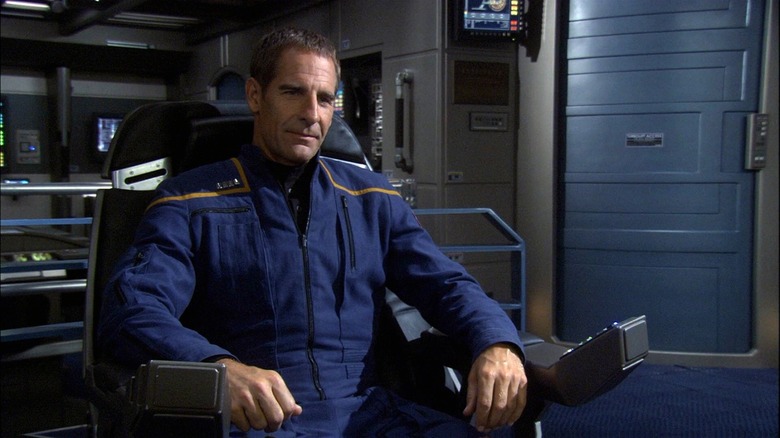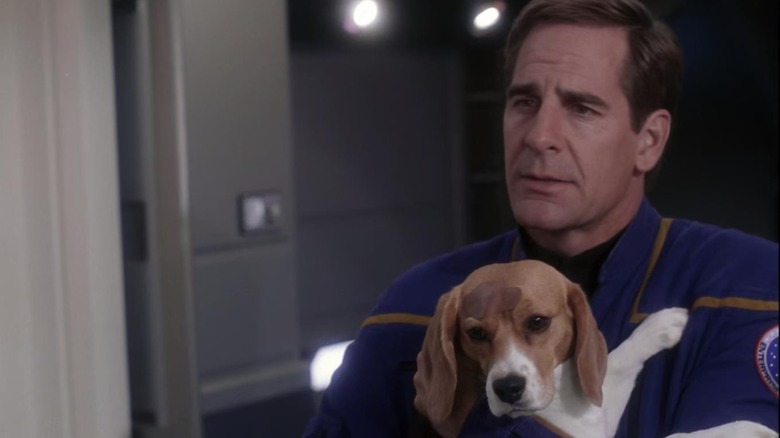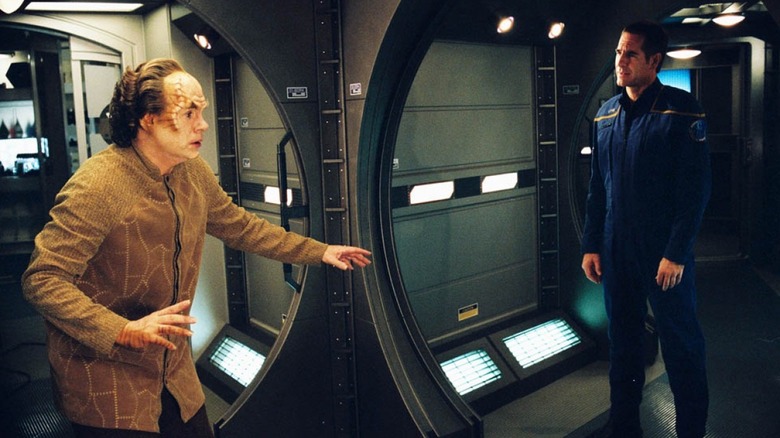Scott Bakula's Star Trek: Enterprise Casting Caused A Brief Panic Behind The Scenes
With the possible exception of LeVar Burton, actor Scott Bakula was the biggest American celebrity to be cast as a main character on a "Star Trek" show up to that point. "Star Trek" typically cast recognizable working actors with solid careers, or newcomers and professionally trained stage performers. The characters and the setting were the key selling points, not the dazzle of celebrity. It's possible that the casting directors of Trek shows wanted the franchise to retain a timeless quality. The risk of casting a hot-right-now celebrity could potentially rob from that timelessness.
More recent "Star Trek" shows have cast more famous people — Michelle Yeoh is a notable standout — but for the most part, casting would fall into the realm of "Hey! It's the actress from 'Remo Williams!' or "Why is Cheryl McFadden calling herself Gates now?"
The makers of "Enterprise," however, were not intimidated by Bakula's popularity. Indeed, their description of his character, Captain John Archer, matched the actor's talents to a T. Also, Bakula's association with "Quantum Leap" assured that he'd have a sci-fi imprimatur that could only add credibility to the new "Star Trek" program. Bakula's fame, however, opened another avenue for stress: the actor's busy schedule. It seemed that Bakula's contract to play Captain Archer wasn't finalized until mere days before shooting was to begin. There was, it seems, a very real possibility that he would walk away from "Enterprise" to do another show on another network.
In the exhaustive oral history book "The Fifty-Year Mission: The Next 25 Years: From The Next Generation to J. J. Abrams," edited by Mark A. Altman and Edward Gross, the makers of "Enterprise" recall the casting process and the minor headaches therein.
No backup for Bakula
James L. Conway, one of the directors on "Enterprise," revealed that there was no backup plan if Bakula should walk away, and the showrunners would have had to scramble to audition for a replacement. Trekkies will recall that something similar already happened during the making of "Star Trek: Voyager" in 1994. For a few days, actress Geneviève Bujold played the role of Captain Janeway, and several scenes were shot with the actress. She famously walked off the set when she couldn't cope with the wildly paced TV shooting pace, and Kate Mulgrew had to be brought in at the last second. One can find footage of Bujold's scenes online.
Conway recalls both the stresses and the delights of working with the "Lord of Illusions" actor, saying:
"Scott Bakula was the only actor ever discussed for Archer. Problem was, his deal wasn't closed until the table read of the script three days before production began. In fact, there were rumors he was going to a CBS comedy pilot and we got very worried. We had never met him, talked to him, or heard him do the material. All during the casting process the casting director was the only one to read Archer's dialogue. So it was a relief and pleasure to hear Scott brilliantly bring Archer to life at the table read."
Meanwhile, Bakula didn't address rumors that he was in talks to do a comedy series on CBS. He just said that he "liked the character," and that "Enterprise" was "really a return, in many ways, to what the original 'Star Trek' was all about." He, like the fans, was likely drawn to the show's exciting sense of frontiersmanship. "Enterprise" follows Starfleet's very first vessel into space, so everything was new.
Archer's personality
Everything worked out largely because Bakula so capably occupied John Archer as a character. By the report of "Enterprise" writer Chris Black, Bakula is an irrepressibly nice person, and that fit into the awestruck, almost boyish enthusiasm of a character like Archer. Black noted that "Star Trek" captains in the past were self-assured to the point of bumptiousness. Archer, by contrast, was often out of his element, unsure of himself, but happy to be there. It wouldn't be until Captain Pike (Anson Mount) on "Star Trek: Strange New Worlds" that audiences would see a starship captain that seemed to genuinely love their job. Black said:
"I loved writing for Scott, because he's Scott. He's just the best. And there were a lot of people who criticized him as a choice for captain. Too soft. Too Boy Scout-y. In my opinion, what made William Shatner such a great Kirk was he's kind of an arrogant a**hole. And that's who that character is. He's got that swagger and that arrogance. To some extent, Scott is almost too nice a guy. In real life, he's such a delight and such a pro and so respectful and easy to work with that he doesn't have that innate a**hole-ness that makes a great starship commander."
The thesis of "Enterprise" was indeed to get "back to basics." It took place prior to the invention of starship shields, photon torpedos, and transporters that worked on human beings. There was no Prime Directive and humans had just met Klingons for the first time. It existed on a scale in the dead center between NASA and "Star Trek." And Bakula was the character holding it all together, pleased as punch to be having the adventure.


